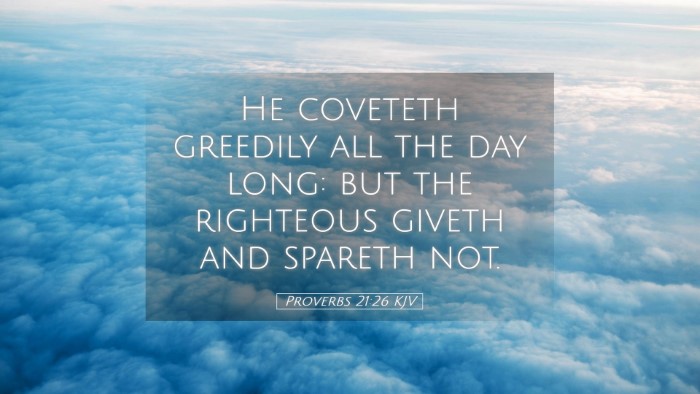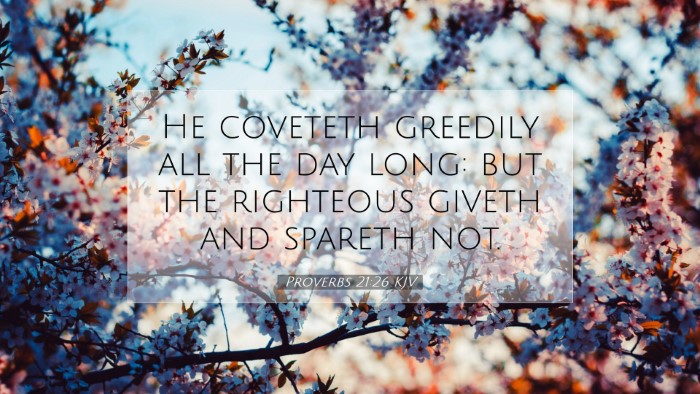Commentary on Proverbs 21:26
Text of the Verse: "He covets greedily all day long, but the righteous gives and does not spare."
Introduction
Proverbs 21:26 presents a stark contrast between the behavior of the greedy and that of the righteous. This verse encapsulates a profound truth about human nature and the moral fabric of society. The insights of various public domain commentators shed light on its implications and provide a deeper understanding of the moral lessons contained within.
Matthew Henry’s Commentary
Matthew Henry elaborates on the two contrasting characters presented in this verse. He notes that the "greedy" man is characterized by an insatiable desire for gain, an endless yearning that can never be fulfilled. It speaks to a life dominated by materialism and self-interest, leading to a continual pursuit of wealth with no satisfaction derived from it.
Henry emphasizes that this desire is active "all day long," highlighting the relentless nature of greed. It is a reminder that such covetousness is not a passive emotion but an active, driving force that consumes the individual’s thoughts and actions.
In contrast, the "righteous" person is depicted as someone who gives and does not spare. Henry points out that true righteousness is marked by generosity and selflessness. The righteous individual finds joy in giving, reflecting God's nature, which is ultimately generous and loving. This generosity stems from a heart aligned with divine principles, contrasting sharply with the greedy individual's heart that is hardened and self-centered.
Albert Barnes’ Commentary
Albert Barnes focuses on the distinction between the covetous and the generous, suggesting that this verse provides a moral lesson about priorities. He posits that the verse illustrates the idea that simple greed can consume a person, leading to an endless cycle of dissatisfaction and longing. The greedy individual spends their days in worthless pursuits, hoarding wealth and possessions which ultimately brings no true happiness.
In Barnes' view, the righteous person's actions serve as a moral counterpoint. Their willingness to give—without reservation—demonstrates a sense of purpose and fulfillment that transcends material wealth. This act of giving fosters community, kindness, and an acknowledgment of the interconnectedness of people. By sharing with others, the righteous not only meet the needs of those around them but also adhere to a higher calling that reflects the character of God.
Additionally, Barnes observes that the persistent nature of greed can lead to despair. Conversely, the joy found in giving can result in spiritual fulfillment and an enriched life.
Adam Clarke’s Commentary
Adam Clarke approaches Proverbs 21:26 with an emphasis on the psychological implications of greed versus righteousness. He comments on the futility of being consumed by greed, suggesting that it breeds an endless cycle of longing without the prospect of true fulfillment. Clarke draws attention to the idea that coveting leads to moral decay and social discord, symbolizing a life that is inherently disconnected from God’s design for humanity.
Clarke further elaborates on the phrase "the righteous gives and does not spare," illustrating that righteous living is coupled with generosity. He emphasizes that this giving is not only about material possessions but also encompasses a spirit of compassion and empathy towards others. This open-handedness is a sign of spiritual health and an indication of living in alignment with God's will.
Moreover, Clarke suggests that the practice of generosity cultivates deeper relationships and fosters a supportive community. It positions the giver in a place of blessing—both for themselves and for those who receive. Thus, the act of giving becomes a transformative experience that leads to greater spiritual growth.
Practical Applications
From the insights provided by these commentators, several practical applications emerge for pastors, theologians, and students of Scripture:
- Self-Reflection: Evaluate personal desires and motivations. Are they aligned with the values of generosity and righteousness, or are they consumed by greed?
- Encouraging Generosity: In church teachings, emphasize the importance of generosity as a reflection of God’s character. Promote acts of service and giving within the community.
- Cultivating Contentment: Teach about the dangers of coveting and the value of contentment, encouraging believers to seek fulfillment and joy in relationships and spiritual growth rather than material possessions.
- Creating Supportive Communities: Foster environments where giving is encouraged, whether it be through sharing resources or supporting each other in times of need, emphasizing how this reflects Christ’s love.
- Spiritual Growth: Encourage practices that cultivate a generous spirit, such as tithing, volunteering, and acts of kindness, aligning with the principle of righteousness highlighted in this verse.
Conclusion
Proverbs 21:26 serves as a powerful reminder of the consequences of our desires and actions. The contrast between the covetous and the righteous offers profound wisdom for daily living. Through the combined insights of Matthew Henry, Albert Barnes, and Adam Clarke, we understand that a life rooted in righteousness is characterized by generosity, fulfillment, and alignment with God’s will, while a life consumed by greed leads only to emptiness and despair. As believers, may we strive to embody the qualities of the righteous, thus reflecting God’s love and generosity in all that we do.


